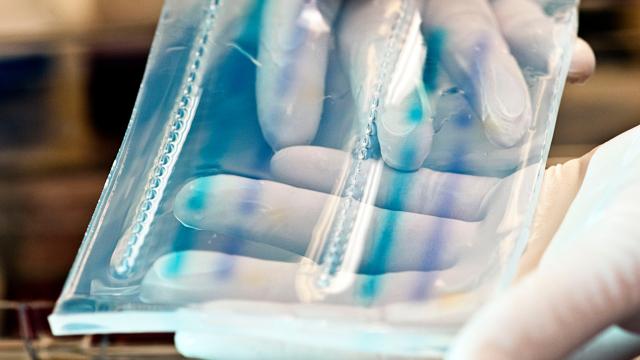Last May, a journal published results suggesting that the revolutionary gene-editing technique CRISPR might actually be quite dangerous. The paper caused a bit of turmoil in the biotech world, which is looking to CRISPR as a major disease-fighting tool of the future. But it didn’t take long for the study to attract some serious scepticism. This week, the journal that published the paper, Nature Methods, finally retracted it.
A DNA gel. Photo: University of Michigan/Flickr
In the study, researchers found that when they used CRISPR to cure blindness by changing DNA in mice, it resulted in more than a thousand unintended effects on other genes. This was a really big deal. It’s long been known that, even as precise a gene-editor as CRISPR is, off-target effects are a troublesome potential side effect. But more than a thousand such unintended edits is a lot.
This, the authors wrote, meant that CRISPR needed significant fine-tuning before it could be the wondrous cure for so many human diseases the world had hoped it would be. Biotech stocks tumbled. The scientific community flipped out.
Soon, though, other researchers began accusing the study authors of “careless mistakes” and flaws in the methodology of their mouse study. In February, the work was further discredited when scientists at the Wellcome Sanger Institute in Britain recreated the original study and found that there weren’t significant unexpected mutations.
But the final nail in the CRISPR coffin seems to have come this week, when the original study authors posted a new preprint paper in which, in a new mouse experiment, they used their previous methodology to look for potential off-target effects and did not find an excess of unintended genetic mutations, as they had in their initial work.
“Our previous publication suggested CRISPR-Cas9 editing at the zygotic stage might unexpectedly introduce a multitude of subtle but unintended mutations, an interpretation that not surprisingly raised numerous questions,” they wrote.
“These whole-genome-sequencing-level results support the idea that in specific cases, CRISPR-Cas9 editing can precisely edit the genome at the organismal level and may not introduce numerous, unintended, off-target mutations.”
Just a few days later — and after almost a year of controversy in the scientific community — Nature Methods retracted the paper.
“There was insufficient data to support the claim of unexpected off-target effects due to CRISPR in a paper published in Nature Methods. More work is needed to determine whether such events occur in vivo,” the journal wrote in an editorial explaining the decision.
The exact genetic makeup of the lab mice’s parents was not known, and the control group of mice and the CRISPR’d mice weren’t siblings, the editorial explained, so it was impossible for the researchers to tell whether the genetic differences between the control mice and the CRISPR’d mice was due to off-target effects or just natural variation.
“The central claim of the paper is therefore not sufficiently supported by the data. This is the reason for retraction of the paper,” the editorial explained.
“The original paper was peer reviewed, but we should have sought at least one additional referee with expertise in the genetics of inbred mouse strains.”
The journal also published five of these critiques of the original work in its latest issue.
But, as the editorial points out, there is still little known about the off-target effects of CRISPR when used inside the body of a human or animal. And off-target effects are still definitely a real concern.
“On the question of whether CRISPR can be safely used in vivo, the stakes are high for many,” the editorial read. “But for none are they higher than for the people in whom this technology may be used in the future. They are owed a careful and rigorous answer.”
